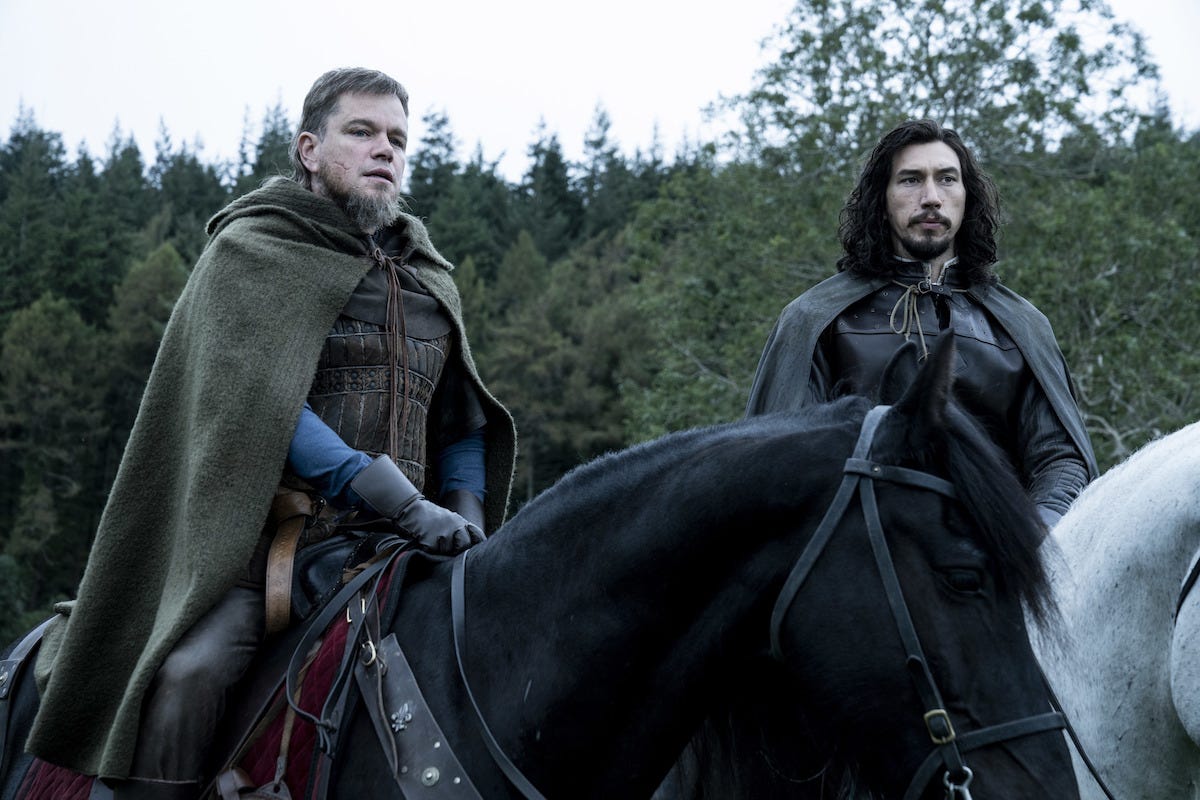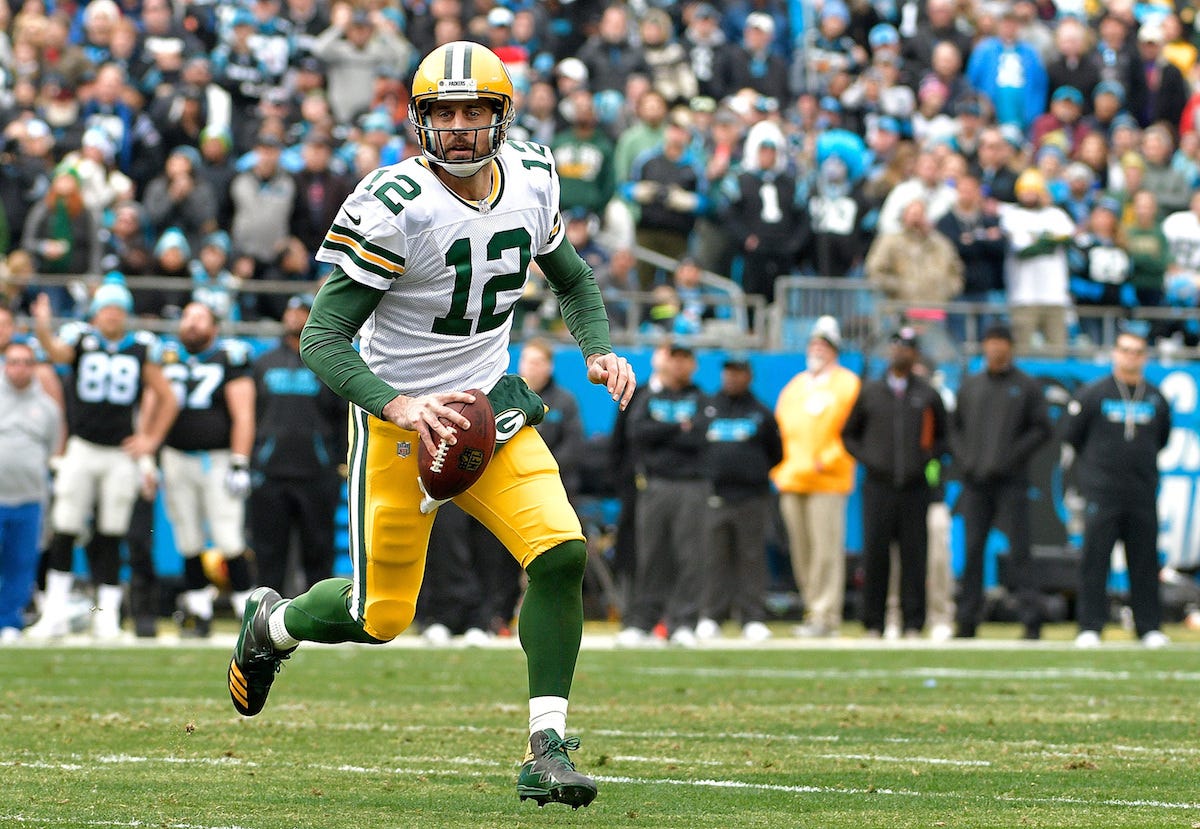The Last Duel Review
The Last Duel has been pitched to audiences as a relatively dour Ridley Scott historical epic about a royal woman whose claims of rape are disbelieved by the courts and must be settled via duel between the accused and her husband. While the trailer captured the broad strokes of the plot, it has the tone all wrong, as The Last Duel isn’t particularly dour at all. Indeed, it’s often oddly funny in addition to being quite pointed and poignant, as one might expect from the screenwriters of Good Will Hunting.
Oscar-winning writers Matt Damon and Ben Affleck are credited alongside Nicole Holofcener on the screenplay, and it’s tempting to think of The Last Duel as the Boston bros working out their own issues as they grapple with the downfall of their longtime patron, Harvey Weinstein. Perhaps. But it is not a simple reckoning, and the moral shadings make for some interesting character work.
Damon plays Jean de Carrouges, a French warrior-noble whose first wife and child died of plague. Returning from war he finds himself unable to meet the taxes levied by Pierre d’Alençon (Affleck) and collected by his one-time friend Jacques Le Gris (Adam Driver), so he marries Marguerite (Jodie Comer), the daughter of a man who betrayed the French crown in a previous campaign and needs Carrouges’s good name to restore repute to his family’s holdings. Carrouges grows jealous of Le Gris’s influence at court and the fact that Le Gris has been gifted a valuable piece of land, while Le Gris covets Marguerite, leading to the assault, a trial, and the titular duel—a duel that will result in Marguerite’s death as well as Jean’s, should he lose.
Told in a tripartite Rashomon style, The Last Duel first looks at these events from Jean de Carrouges’s point of view before shifting to Jacques Le Gris’s point of view and, finally, “the truth,” from the victim’s point of view. The different shadings depending on the POV given are subtle and interesting; while Carrouges’s remembrance of his time at war emphasizes his own desire to aid innocents even if it invites strategic disaster and his saving Le Gris’s life, Le Gris recalls de Carrouges as impetuous, foolish, and a bit of a dullard. Marguerite is seen alternately as an innocent and a temptress, and then, from her own point of view, as a woman victimized twice over, first by Le Gris and then by the court of public opinion.
Again, in the broad strokes, none of this is particularly subtle. “Medieval Me Too” would be an acceptable elevator pitch. But Affleck is doing some very curious work as d’Alençon, a sort of decadent nobleman with eight children of his own who does not allow his own family to stop his whoring about with women at court and whose contempt for the dull de Carrouges and enjoyment of Le Gris’s intelligence blinds him to the reality of Marguerite’s charge. Indeed, Affleck feels like he’s in a slightly different movie altogether, a bro-com set in the middle ages. There’s an insouciance to his performance as d’Alençon, a mildly out-of-touch madness, as when he asks Le Gris which color shoes best match his outfit before going with the gold pair.
The stars involved in this movie have all had a pretty interesting year. Comer’s the soul of both this movie and the year’s biggest surprise at the box office, Free Guy, and while it’s hard to imagine two more different pictures she’s excellent in both; she has a sort of fresh-faced, wide-eyed innocence that hides a deeper reservoir of strength and cunning in each picture. Adam Driver plays a different type of Me Too aggressor in the operatic Annette, but he commits quite hard to the bit in both. Damon has now offered a portrait of out-of-his-depth masculine fragility here and in Stillwater. And Affleck wrapped up his run as Bruce Wayne and Batman in Zack Snyder’s Justice League, for the dark humor of which he never got quite enough credit.
Without spoiling them, all four do subtle and wonderful work in the film’s closing moments, Ridley Scott constructing a series of images designed to convey that this whole struggle had less to do with Marguerite’s ordeal than the sensibilities and sensitivities of the men involved. The Last Duel is an odd combination of straightforward and slightly mischievous. It is well worth your two-and-a-half hours.
If you enjoyed this review and hope to convince others to see The Last Duel, please share this newsletter with a friend! And sign up for Bulwark+ if you haven’t already.
Entertainment’s Big Business: Sports
For all the talk about Netflix shows that are watched by tens of millions of people for two minutes, we sometimes forget that one of the biggest drivers of televised and streamed entertainment is neither movies nor binge-watched shows. To what am I referring?
Sports.
That’s one of the reasons I wanted to talk to Ryan Faughnder this week on The Bulwark Goes to Hollywood; in his newsletter this week he highlighted one of the tricky aspects of live sports: how to balance the needs of an in-demand service with money to burn (in this case, sportsbooks—venues for gambling on games—appealing to folks looking to make a quick buck) with the desire of consumers (and regulators) not to be overwhelmed by such ads.
Sports remains one of the very few avenues through which advertising is terribly effective. The rise of DVRs and time-shifted viewing of TV shows combined with the growing dominance of ad-free streaming on services like Netflix and HBO Max means that advertising is both scarcer and less valuable, with one crucial exception. That one thing you can’t really time shift. That one thing you stay glued to the TV for lest you miss a touchdown or a home run or a goal.
Sports.
The numbers are a little bit mind-boggling. Here’s some anecdata recently highlighted by the Entertainment Strategy Guy:
As the ESG noted, 65.2 million people is roughly equivalent to Netflix’s entire U.S. subscriber base. And what are those people watching? You guessed it!
Sports.
This is not to say that streaming and sports are incompatible. ESPN+ has leveraged its deal with the UFC into impressive numbers, hitting nearly 15 million subscribers. Prime Video has made deals with the NFL to stream some games, and the Red Zone is, like, the original sports streamer: no ads, just action. You can even watch soccer games on some streamer or another.
But live sports generally remains the province of live TV, and live TV means lots of ads to sell and lots of money to be made. And in recent years, ads for sports have meant ads for gambling on sports. There’s a really interesting book by Albert Chen called Billion Dollar Fantasy about the rise of daily fantasy sports—you know, Fan Duel and Draft Kings and the like—and how, one NFL season, there were so many ads for the sports-betting services during games that it almost killed them altogether. People just hated them so much they didn’t want anything to do with daily fantasy, the names of the services became literal punchlines.
I don’t talk about sports a ton in this newsletter because my interests lie elsewhere. But it’s clear that sports are more important, economically, than just about any other segment of the traditional TV market that’s left standing. It will be very curious to see how much longer that lasts as streamers begin to bid up the contracts for the NFL, NBA, and MLB.
Assigned viewing: Black Hawk Down (HBO Max)
I’ve always loved this 2001 flick, but I love it more and more as the years go by and you realize that it is, essentially, the Rosetta Stone for understanding male Hollywood stardom in the 21st century.
I mean, sure, I recognized a great like Sam Shepard and a beloved character actor like Bill Fichtner or Tom Sizemore and a younger rising star like Josh Hartnett or Ewan McGregor. And there were guys whom the movie clearly made stars, like Eric Bana. But watching now, 20 years later, it feels like almost everyone in this movie went on to great things. And every time I rewatch it, I see someone I’ve never realized was in it before.
This time it was Nikolaj Coster-Waldau (Game of Thrones). Previously it’s been Jeremy Piven (Entourage), Hugh Dancy (Hannibal), Ioan Gruffudd (Fantastic Four), Jason Isaacs (too much to recount here), Orlando Bloom (LOTR, POTC), Ty Burrell (Modern Family), and, of course, Tom Hardy. And that’s not even counting character actors like Kim Coates and Zeljko Ivanek and Tom Guiry and Ewen Bremner and Glenn Morshower.
Anyway! Good movie. Amazing cast.








Well done review of Last Duel. Also, have seen BHD a couple of times. Good pic. Think the strengths and recognizability of Shepard, Sizemore and the other older cast members made the performances of the younger ones more poignant and believable. Cripes, has it really been 20 years? Tempus fugit, for sure!
In the coverage of The Last Duel that I’ve seen so far, I’m a bit surprised to see no mention of Ridley Scott’s first feature film, The Duellists. Napoleonic War era swordsmen, not medieval knights, but he’s been doing lethal combat challenges for close to half a century. The Duellists is simply gorgeous. Best Debut at Cannes in 1977